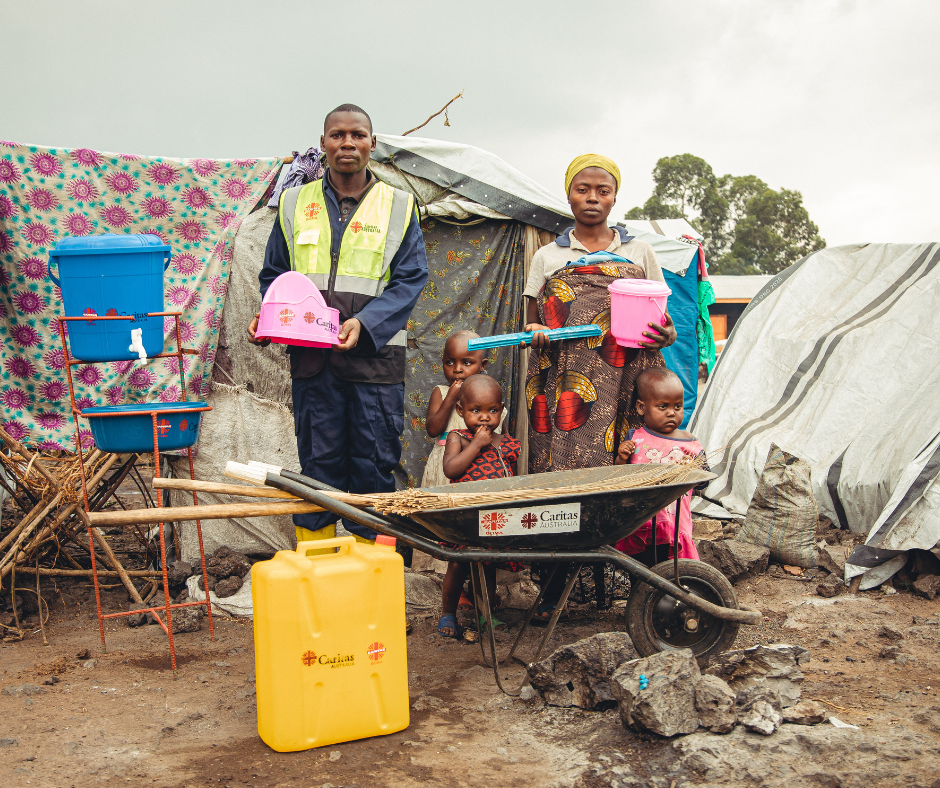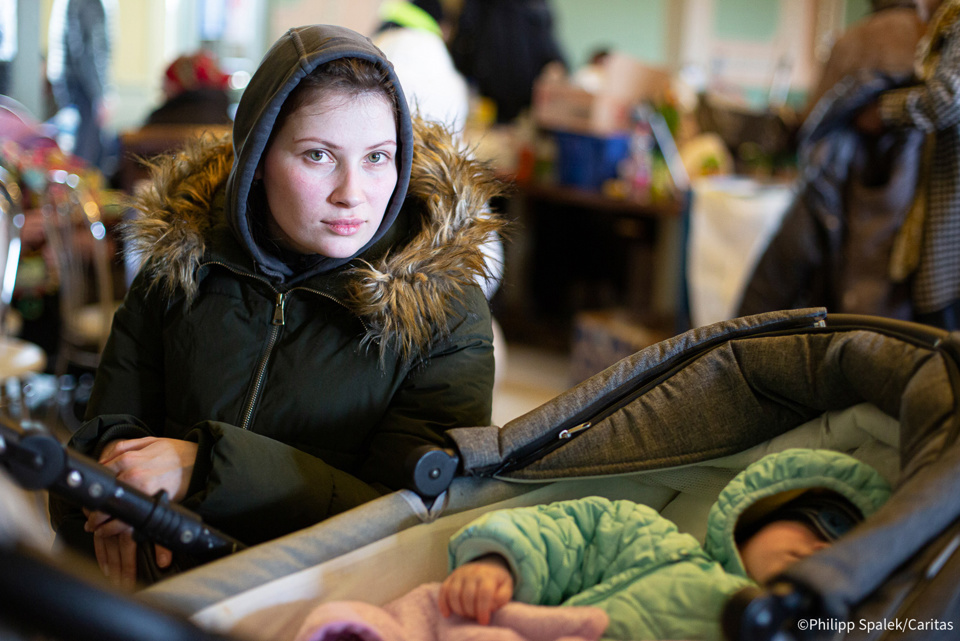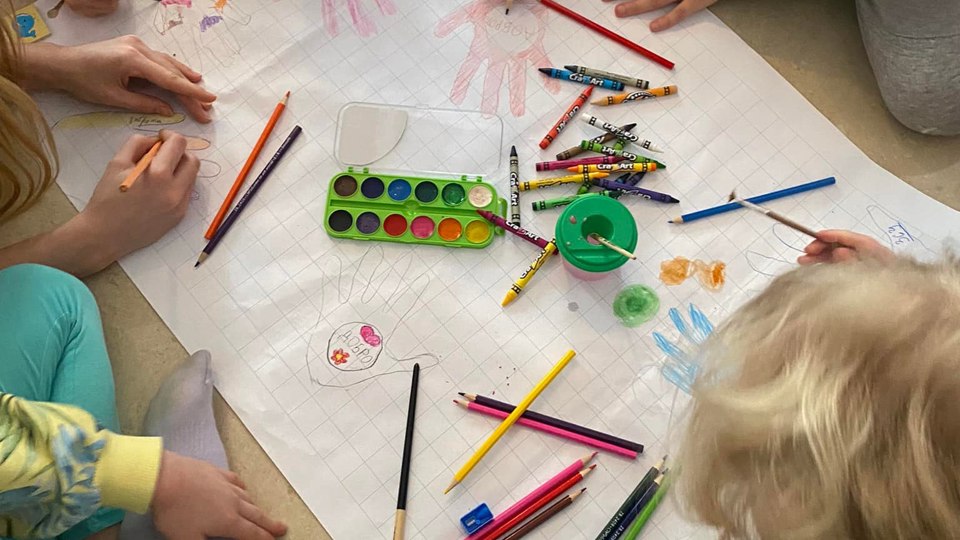Refugees and Displaced People
Over 120 million people have been forced from their homes worldwide. Give now to help deliver urgently needed humanitarian aid.

Sakhina with her daughter and grandson inside their family home in Cox's Bazar refugee camp. Photo: Caritas Australia
The numbers:
120 million people
have been forced to flee their homes worldwide
43 million people
have crossed international borders
40% are children
aged under 18 years
2 million children
were born as refugees in 2018-2022
Our partners are on the ground providing vulnerable communities with:
WASH programs
clean drinking water, sanitation and hygiene
Emergency shelter
reducing risks for vulnerable families
Medical support
access to basic family medicines and sanitation can help prevent the spread of disease
Psychosocial support
critical in helping displaced people recover from the experience of trauma

Marian and her eight-month-old daughter queuing at the Trócaire health outreach centre at an Internally Displaced Persons camp in Gedo district, southern Somalia. Trócaire is one of Caritas Australia’s partners. Photo: Miriam Donohue: Trócaire.
Africa

A young boy who has fled the bombing in Odessa, Ukraine at the Palanca border crossing. Photo: Marijn Fidder, Caritas Germany.
Ukraine

Aftermath of the May 2024 fire. Photo credit: Caritas Bangladesh.
Bangladesh
Case study: Marian from Somalia
Marian's livelihood has been decimated after four years of drought caused by climate change.
“We had no food or water because of the drought,” she says. “Our crops failed and our goats died. Our livelihoods are gone. We were hungry and desperate.”
Like so many others, she left her home because she had no other options. She walked across Somalia with her eight-month-old daughter to get to Gedo in southern Somalia, hoping to find more food and water, or at least humanitarian aid.
“We walked for five days and nights with little food or water to get here,” she says. “We have been here for several weeks, maybe even a month, and still have not been properly registered with the authorities.”

Marian and her eight-month-old daughter queuing at the Trócaire health outreach centre at an Internally Displaced Persons camp in Gedo district, southern Somalia. Trócaire is one of Caritas Australia’s partners. Photo: Miriam Donohue: Trócaire.

Sibomana and his family in an IDP camp. Photo: Bitita Dany/Caritas Goma
Case Study: Sibomana from Democratic Republic of the Congo
Sibomana is 34 years old and a married father of six children. War forced his family to flee their home in August 2022.. Since then, they have been living in a camp for Internally Displaced Peoples (IDPs), in the province of North Kivu. A native of the Kisigari sub-chiefdom in Rutshuru territory, "Sibo" as his relatives call him, was chosen as a hygiene promoter because of his leadership skills and knowledge of community mobilization. Hygiene promoters organize community awareness sessions, and disinfect public toilets and households exposed to the risk of cholera.
As one of 51 members of the hygiene committee (80% of whom are IDPs), he has been equipped, supported, and accompanied by Caritas Goma in implementing hygiene and sanitation measures in various IDP camps and sites.
As part of this work, Sibomana earns a bonus at the end of each week, which allows him to support the needs of his family.
Case Study: Illyena from Ukraine
23-year-old Ilyena, her husband Andrei and their 9-month-old son Bagdan, decided to flee Kharkiv. After sheltering in a crowded metro station, they walked for hours through dark metro tunnels until they reached their car. It took them six days to drive to the Polish border. After they crossed, volunteers from Caritas Poland helped Illyena access a sheltered room for mothers and children, where she can access the necessities she needs to care for Bagdan. Andrej had to stay behind as most Ukrainian men aged 18 to 60 cannot leave the country.

Illyena fled Ukraine to neighbouring Poland. Photo: Philipp Spalek/Caritas Poland.
FAQs
Refugees are people who have been forced to flee their homes and have crossed an international border seeking safety. People are granted refugee status when returning them to their country of origin would pose a risk to their life and freedom. According to the UN, almost 70% of all refugees wind up in the neighbouring country.
While refugees cross international borders, displaced people have been forced to flee their homes but remain in their country of origin.
A refugee camp is an area designated by a government or official body like UNHCR, where people who have fled their homes can find shelter and varying degrees of safety. NGOs often work in refugee camps to bring aid directly to people who need it most.
A migrant is someone who has moved from one country to another to live, while a refugee is specifically someone who has been forced to flee their usual country of residence due to persecution, violence, conflict, or other reasons pertaining to their safety.
No, it is not illegal to cross international borders without the proper documentation to seek safety.
Asylum seekers are people who have crossed an international border in search of safety but have not yet been granted refugee status. All refugees begin as asylum seekers.
Anyone in the world can become a refugee when circumstances arise that make it necessary to seek safety across an international border. Refugees tend to come from areas where violence, persecution and conflict are rife. According to UNHCR, the top countries refugees come from at the current time include Afghanistan, Syria, Venezuela, Ukraine and Sudan.
People tend to flee across an international border when staying in their country of origin poses a risk to their life, freedom or safety.
There are a wide range of circumstances that can cause someone to flee their home, including conflict, violence, persecution, hunger, or any situation which makes it unsafe to remain in their country of origin.
Countries that are signatories to the Refugees Convention have an obligation to not return refugees to a country where their life or freedom would be at risk.

Activities for displaced children in Ivano Frankivsk. Photo: Caritas Ukraine.
Where does my donation go?
The funds you donate to this appeal go to Caritas Australia’s Emergency Response Fund and will be used to provide humanitarian assistance to communities affected by this crisis. Should circumstances prevent us from delivering aid to this emergency, or if excess funds remain after the crisis, donations will be directed to other emergencies where Caritas has humanitarian operations.












